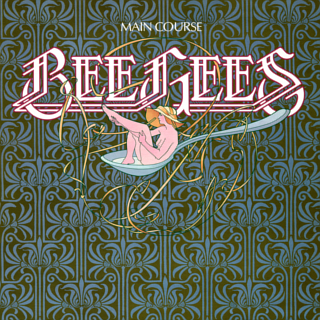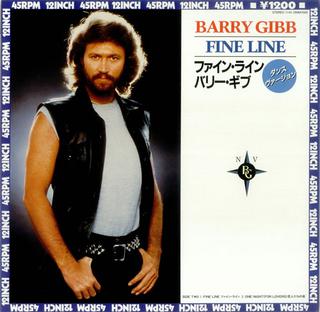
Maurice Ernest Gibb was a British musician. He achieved worldwide fame as a member of the pop group Bee Gees. Although his elder brother Barry Gibb and fraternal twin brother Robin Gibb were the group's main lead singers, most of their albums included at least one or two songs featuring Maurice's lead vocals, including "Lay It on Me", "Country Woman" and "On Time". The Bee Gees are one of the most successful pop-rock groups of all time.

Sir Barry Alan Crompton Gibb is a British musician, singer, songwriter and record producer. Along with his younger brothers, Robin and Maurice, he rose to worldwide fame as a member of the Bee Gees, one of the most commercially successful groups in the history of popular music. Well known for his wide vocal range, Gibb's most notable trait is a far-reaching high-pitched falsetto. Gibb's career has spanned over 60 years.

Now Voyager is the debut solo studio album by British singer-songwriter Barry Gibb, the member of the Bee Gees. It was released on 17 September 1984 by Polydor Records in the UK and MCA Records in the US. Now Voyager was recorded sometime around the year at Criteria Studios in Miami, Florida, and Ocean Way Recording in Hollywood, California, and was produced by Gibb and Karl Richardson. It contains his biggest solo hits, "Shine, Shine" and "Fine Line". The album also included the Olivia Newton-John duet "Face to Face", which was released as a promo single. Gibb co-produced the album with Karl Richardson, who had been working with the Bee Gees since 1975. The front cover photograph was taken by Alex Henderson at Victoria Baths, Manchester.

Main Course is the thirteenth studio album by the Bee Gees, released in 1975 by RSO Records. It was the group's last album to be released by Atlantic Records in the US under its distribution deal with Robert Stigwood. This album marked a great change for the Bee Gees as it was their first album to include mostly R&B, soul and funk-influenced songs, and created the model for their output through the rest of the 1970s. It rejuvenated the group's career and public image, particularly in the US, after the commercial disappointment of their preceding albums. Main Course was the first album to feature keyboardist Blue Weaver who had just left the Strawbs and toured with Mott the Hoople. The album cover with the band's new logo designed by US artist Drew Struzan made its first appearance here.

Living Eyes is the sixteenth studio album by the Bee Gees, released in 1981. It was the band's final album on RSO Records, which would be absorbed into Polydor and subsequently discontinued. The album showcased a soft rock sound that contrasted with their disco and R&B material of the mid-to-late 1970s; having become a prominent target of the popular backlash against disco, the Bee Gees were pressured to publicly disassociate from the genre.

After Dark is the third and final studio album by English singer-songwriter Andy Gibb. It features his last US Top 10 single "Desire", "I Can't Help It" and two Bee Gees numbers "Rest Your Love on Me" and "Warm Ride".
"Rest Your Love on Me" is a country ballad performed by the Bee Gees and written and sung by Barry Gibb. It was the B-side of the US No. 1 hit "Too Much Heaven". Andy Gibb recorded the song as a duet with Olivia Newton-John for his 1980 album After Dark.

"Buried Treasure" is a song written by Barry, Robin & Maurice Gibb, and recorded by American country music artist Kenny Rogers. It was released as the B-side of "This Woman" in January 1984 as the third single from the album Eyes That See in the Dark. The song reached No. 3 on the Billboard Hot Country Singles & Tracks chart and No. 2 on the Canadian RPM Country Tracks chart.
"The Only Love" is a song by the Bee Gees from their 1991 album High Civilization, released as the album's third single. The single's B-side was a previously unreleased live version of "You Win Again", recorded in Melbourne, Australia during their 1989's One for All World Tour. Although the song was released only in Europe as a single there, it did not chart in the UK, but it reached number 31 in Germany. The sleeve art for the single was a photo collage that included an image of Maurice’s daughter Samantha right in the center. A ballad, lead vocals are provided by Barry Gibb.

"Shine, Shine" is a song recorded and released by Barry Gibb. The first single from his debut solo album Now Voyager, it proved to be another hit single for Gibb, as he had previously released the US Top 10 singles "Guilty" and "What Kind of Fool", on both of which he had collaborated with Barbra Streisand. "Shine, Shine," however, was his first entirely solo hit single.

"(Our Love) Don't Throw It All Away" is a song penned by Barry Gibb and Blue Weaver and recorded by the Bee Gees in 1977 on the Saturday Night Fever sessions but was not released until Bee Gees Greatest (1979). A different version was released in September 1978 as the third single by Andy Gibb from his second studio album Shadow Dancing.

"Fine Line" is a 1984 single by Barry Gibb. The song was written by Gibb and keyboardist George Bitzer. It is the second and final single from his debut solo album Now Voyager. It was released in October 1984 in North America by MCA Records and in most countries by Polydor Records. The song was failed to chart in the United States, but it did manage to reach #50 on the Hot Dance Club Songs. The 12" version of this song was remixed by Larry Patterson. This single was less successful than his previous single, "Shine, Shine".

How Old Are You? is the second solo album released by British singer Robin Gibb in 1983, thirteen years after his debut Robin's Reign in 1970. The album was not a great success in America and failed to chart in Britain but it did spawn an international hit in "Juliet" which topped the charts in Germany. The album reached No. 6 in Germany. The album was produced by Robin and Maurice Gibb with Dennis Bryon.
"Stay Alone" is a ballad performed by Barry Gibb that appears on the album Now Voyager in September 1984. And later it was released as a B-side of "Fine Line" in October 1984. In Japan and Spain "One Night " was chosen as the B-side of "Fine Line".
"This Woman" is a song written by Barry Gibb and Albhy Galuten and was performed by American country recording artist Kenny Rogers. It reached No. 2 in the US Adult Contemporary Chart and No. 23 in the US Pop Chart. It was published by Gibb Brothers Music and Unichappell Music.
"Not in Love at All" is a song recorded by Barry Gibb that was included on his third solo album Moonlight Madness but was unreleased and included again on the soundtrack Hawks which was released in 1988 and later.
"Paradise" is a pop ballad recorded by the Bee Gees included on the 1981 album Living Eyes. It was later released as a single in Netherlands and Japan with "Nothing Could Be Good" as the B-side. It was included on the 1983 greatest hits album Gold & Diamonds.
"You and I" is a song written by Barry, Robin and Maurice Gibb and was recorded and performed by Kenny Rogers from his 1983 album Eyes That See in the Dark. Despite not being released as a single, it has been played on the radio, becoming one of Rogers' most popular songs. Barry Gibb sings background vocals on the intro, chorus, interlude. The performer of the song sometimes credited to 'Kenny Rogers and the Bee Gees' because Barry used his falsetto.

The Heartbreaker Demos is a demo version of the album by Barry Gibb. Originally circulating on tape among collectors and later also on CD the album saw a legitimate and wide release on iTunes in October 2006. The album does not include the non-Gibb composition "Our Day Will Come".

"Eyes That See in the Dark" is a song written by Barry and Maurice Gibb in 1982. It was performed by Kenny Rogers for his 1983 album of the same name. It reached #30 on the US Country chart, #4 on the US Adult Contemporary chart, #61 in the United Kingdom and #79 on the Billboard Hot 100.













